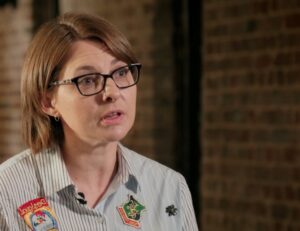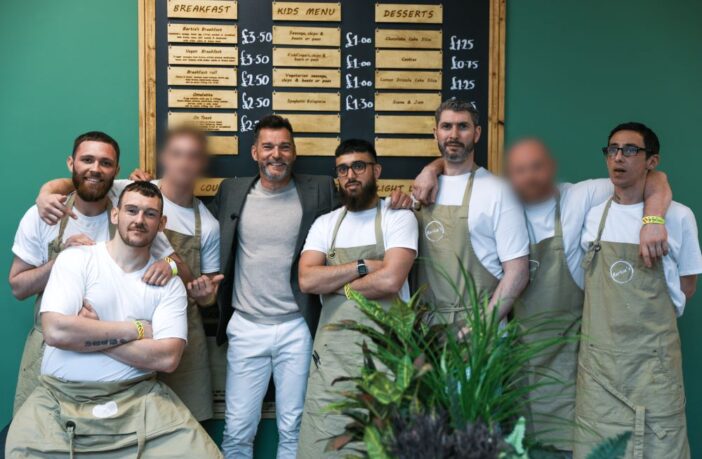Open University history professor Rosalind Crone features in a new film commissioned by the Ministry of Justice showing how prisoners are being given new skills by training them for roles in the catering industry.
“Served” is a 40-minute film available on YouTube that charts the progress of a team of prisoners from HM Prison Lincoln learning catering skills in an on-site purpose-built restaurant called Berties.
The aim is to help them achieve a level of skill so they can fill some of the current 129,000 vacancies in the hospitality industry and earn a living when they are released.

Professor Rosalind Crone is interviewed in the documentary
Rosalind features in the film because of her work as a member of the OU’s Centre for the History of Crime, Policing and Justice.
She sets the scene early on in the film:
“In the early 19th Century, the focus was on punishment and deterrence. The idea was that people who entered prison should not be given any advantage.
“People were very concerned that they were nurseries of crime and hence the rise of reformation, or what we would call today rehabilitation.”
The desire to both punish and rehabilitate led to the provision of work, or employment for prisoners. But she says they also wanted to prevent prisoners from being idle “because idle prisoners were dangerous. They might get up to mischief and cause trouble.”
The use of sentences of imprisonment ‘with hard labour’, which provided a punishment as well as keeping the prisoner busy, became popular. But even then, Rosalind said, some prisons provided prisoners with skills to use when they left prison.
The film cuts back to HMP Lincoln and shows how it was supported by adult skills training provider Peopleplus and charity The Right Course, which is run by TV’s Fred Sirieix, the French maître d’hôtel best known for appearing on Channel 4’s First Dates, and BBC Two’s Million Pound Menu.
He makes appearances in the film, especially when the restaurant opens to prison staff, relatives and friends of the inmates.
Rosalind said there was a fine balance to be made between safeguarding the public and assisting prisoners to change their ways:
“Prisons have a number of roles to play and one is about safe custody. There are a number of people who you have to lock up and an element of society does want to see some kind of punishment for crime.”
She added:
“In 100 years’ time people will look back on this era and they will judge us for the decisions that we make.
“We need to decide are we going to choose punishment or are we going to be radical and try something different along the lines of a reimagined rehabilitated system.”
For more on the history of prisons, rehabilitation and the role of education, a free course, ‘Exploring the history of prisoner education’, developed by Rosalind, is available on The Open University’s OpenLearn platform: https://t.co/X8gMQUEL6d
- The Centre for the History of Crime, Policing and Justice promotes and enables research into criminal justice history around the world and to generate the exchange of ideas between academics, criminal justice practitioners and serving and retired policemen.
- Training of the inmates was also achieved through Peopleplus, one of the leading adult skills and training providers in the UK, delivering adult education, prison education, skills-based employability programmes and support to enable people to live independently across the country.



